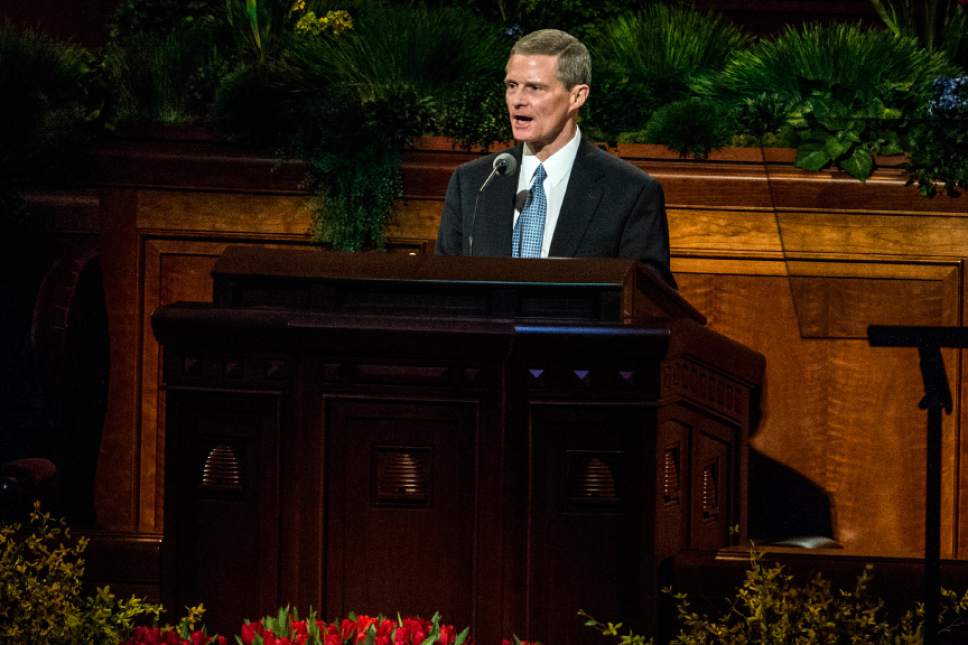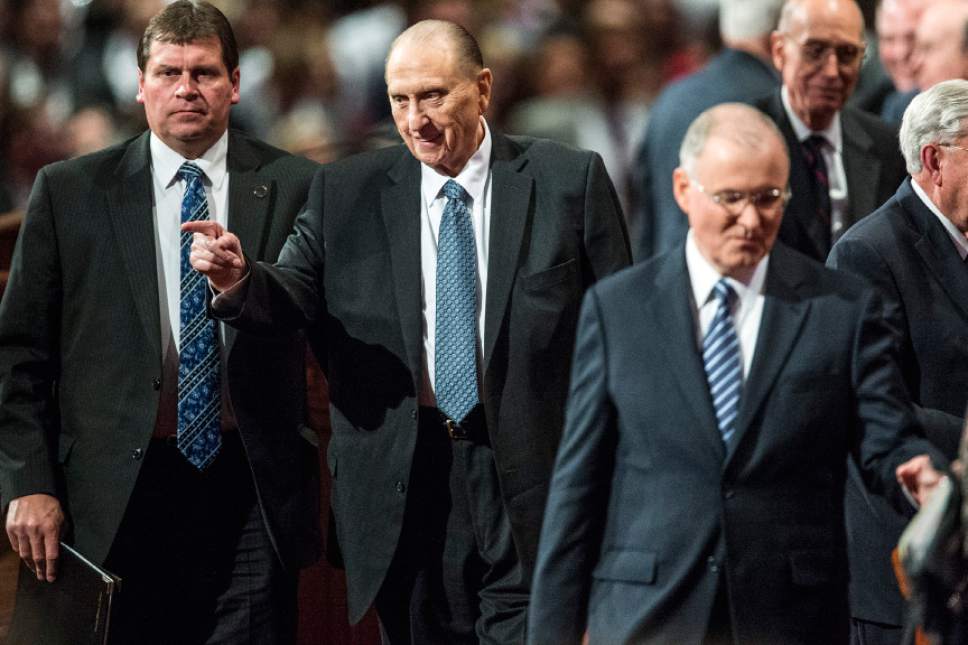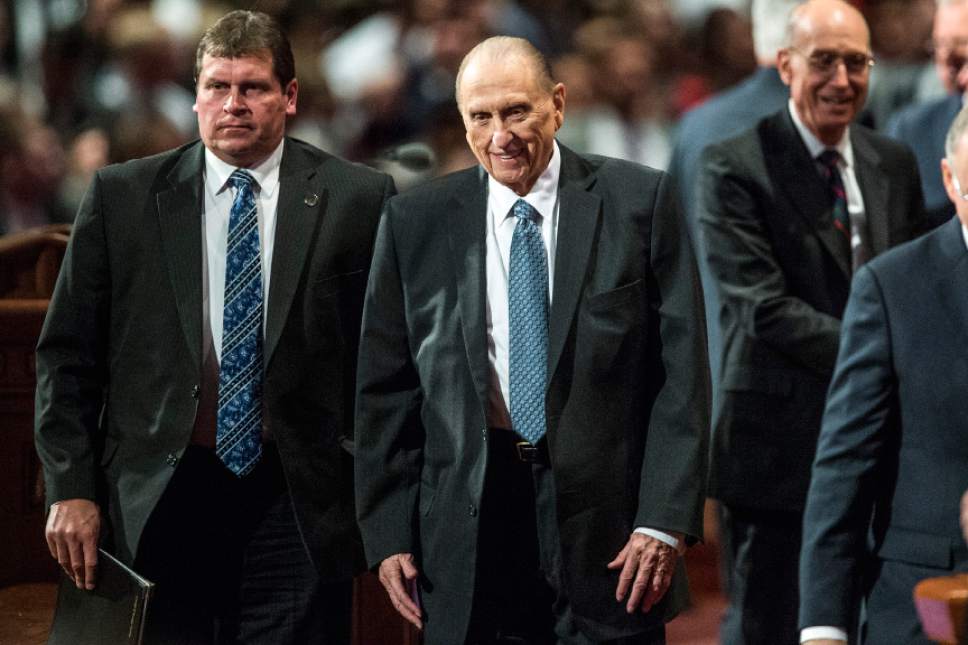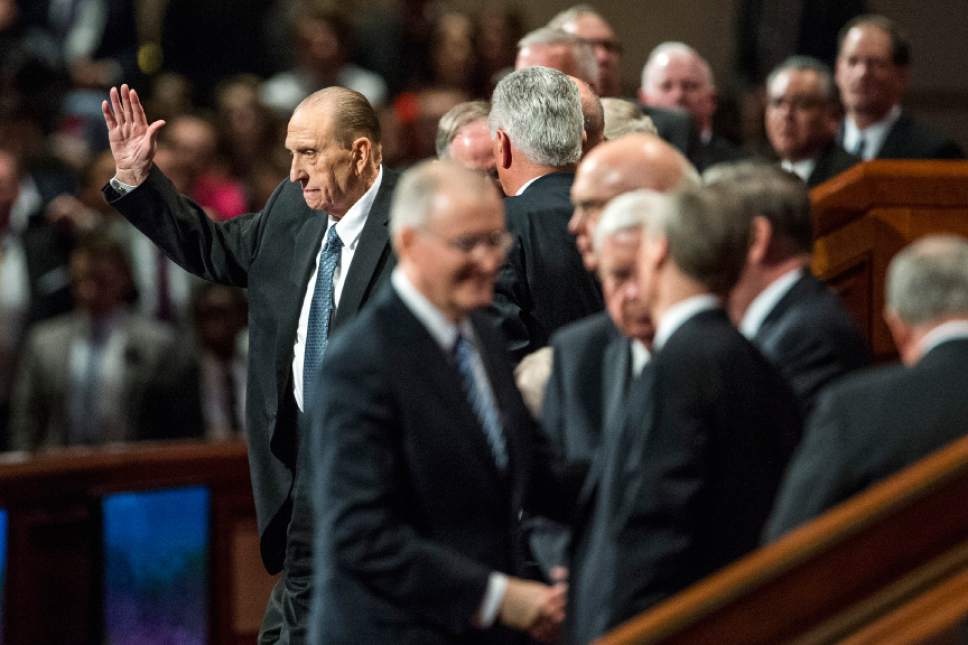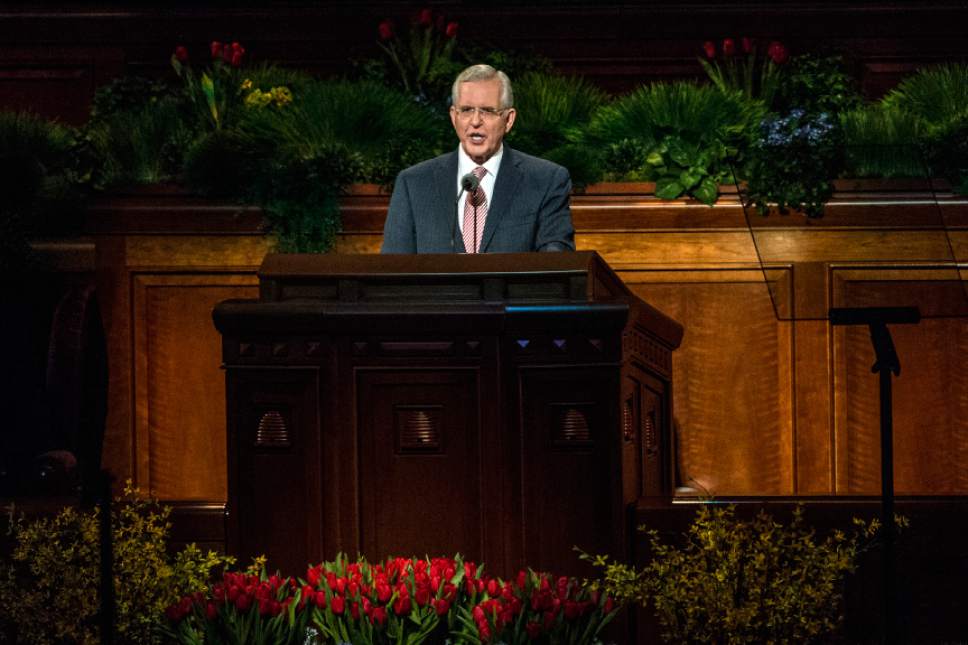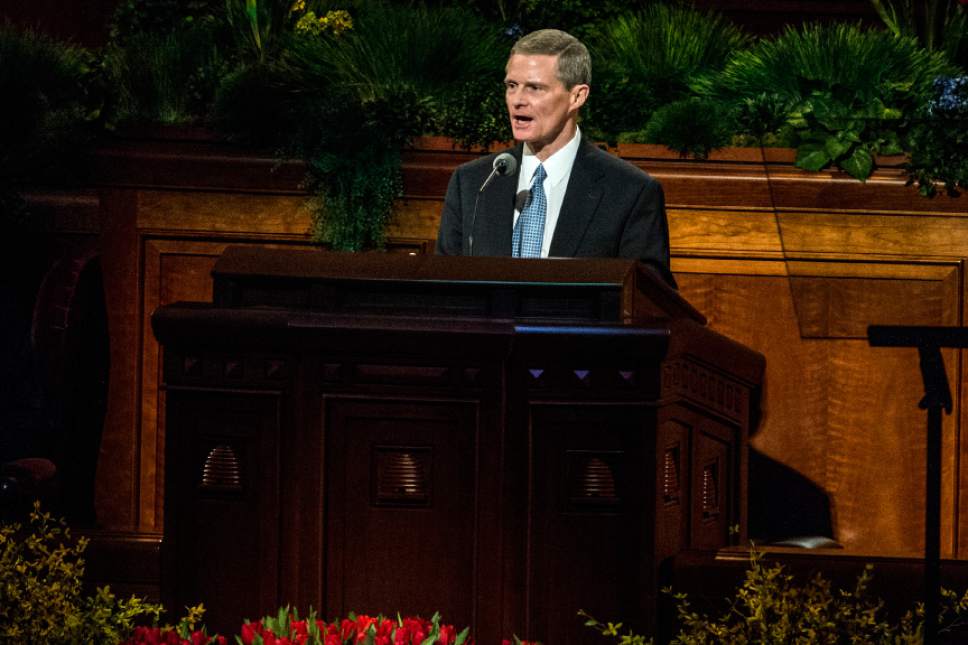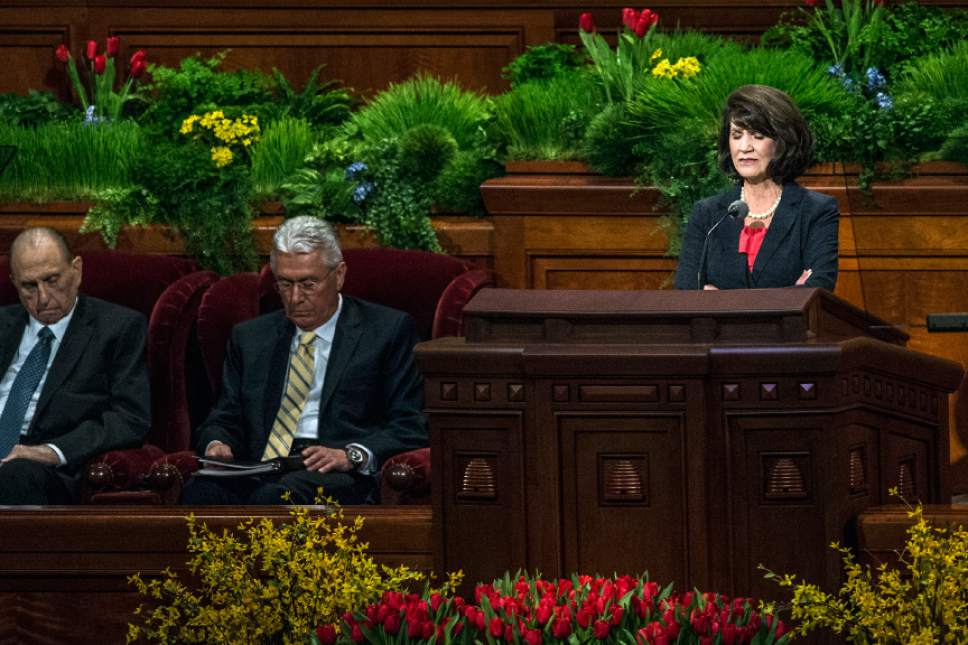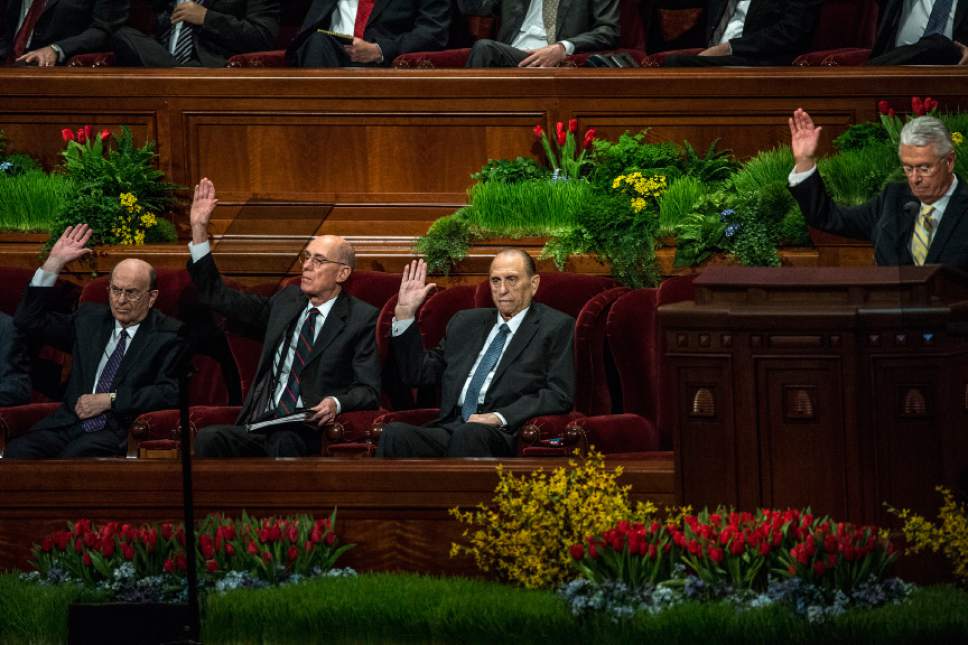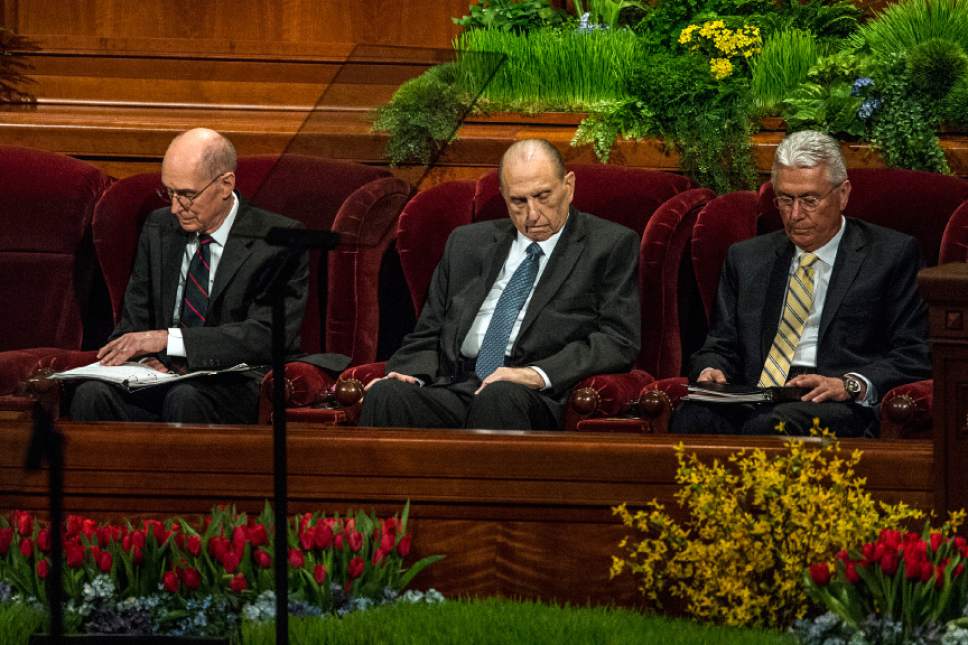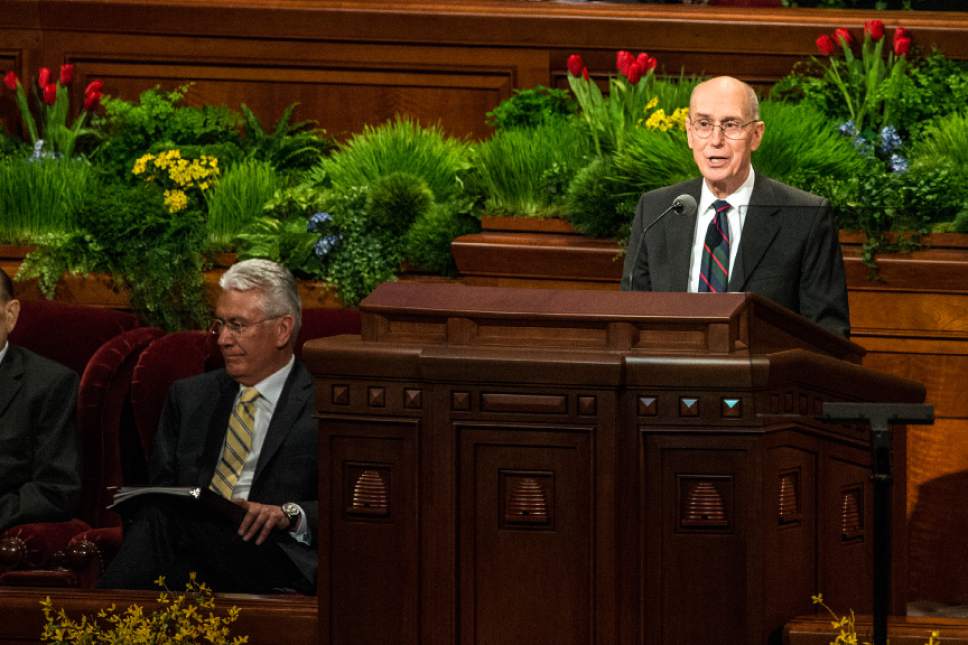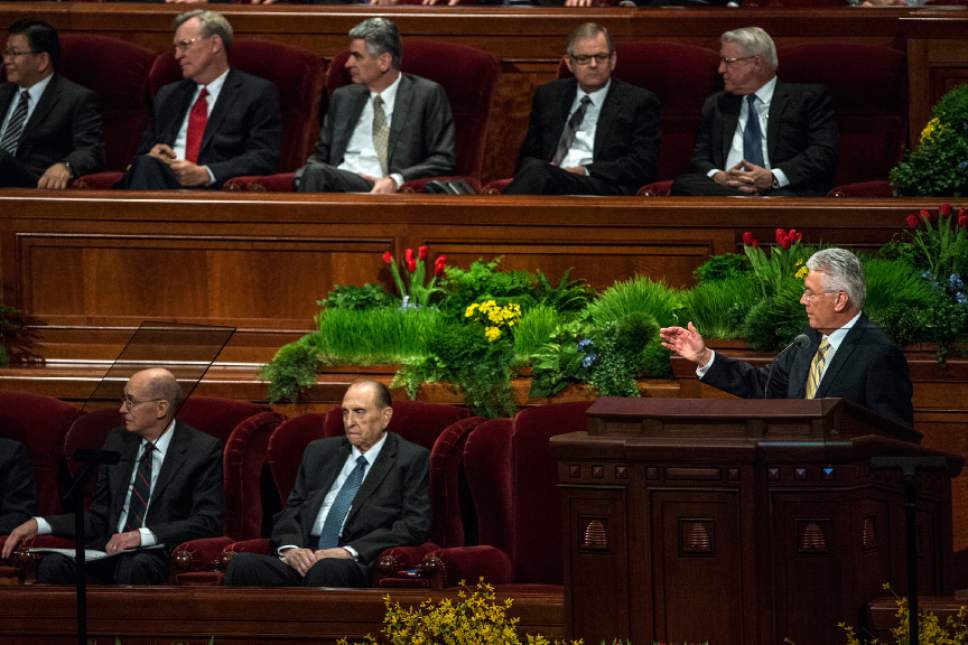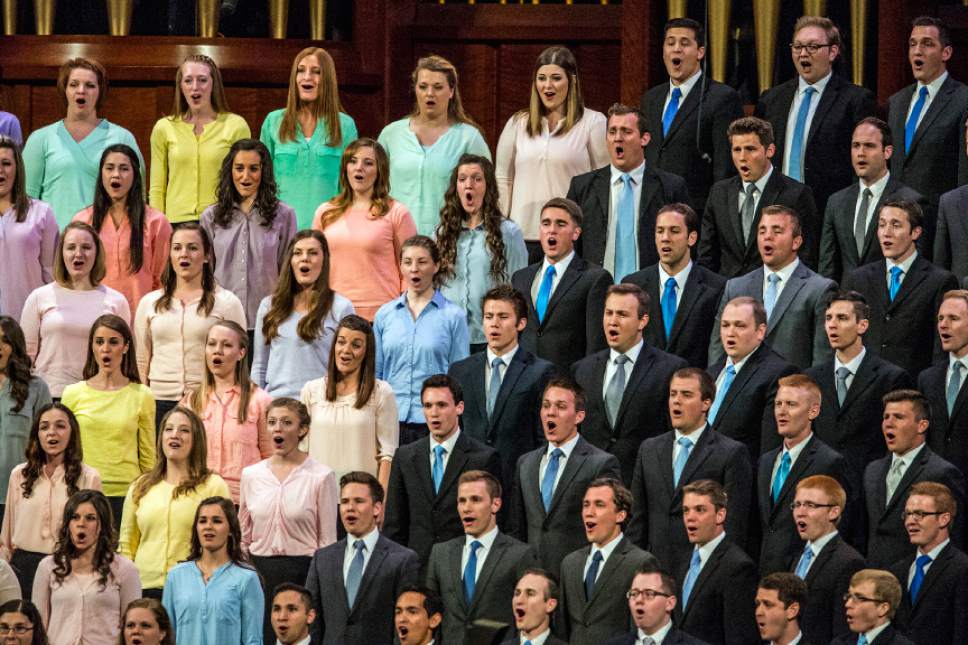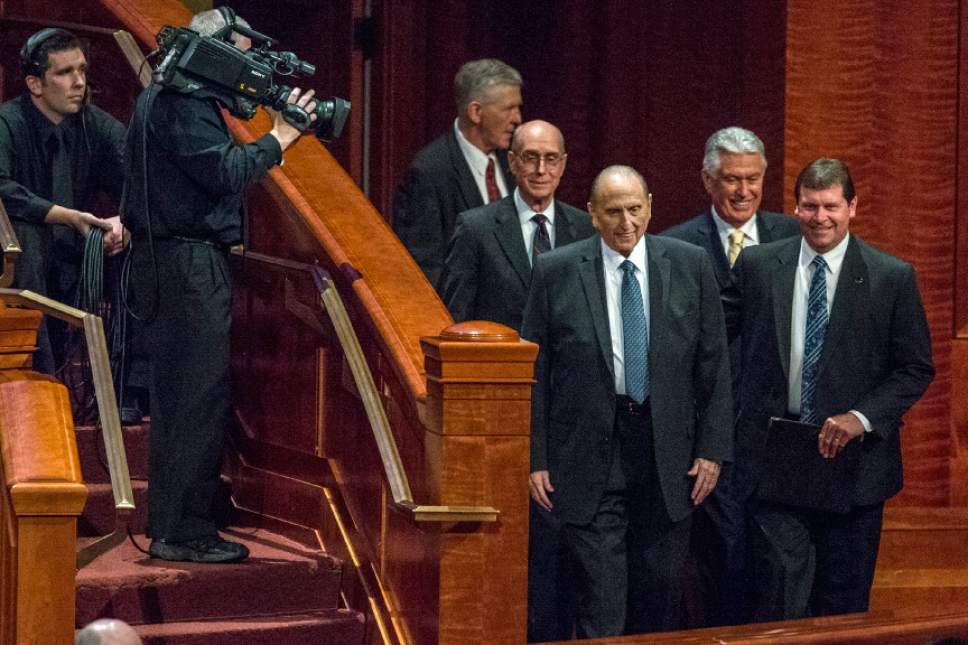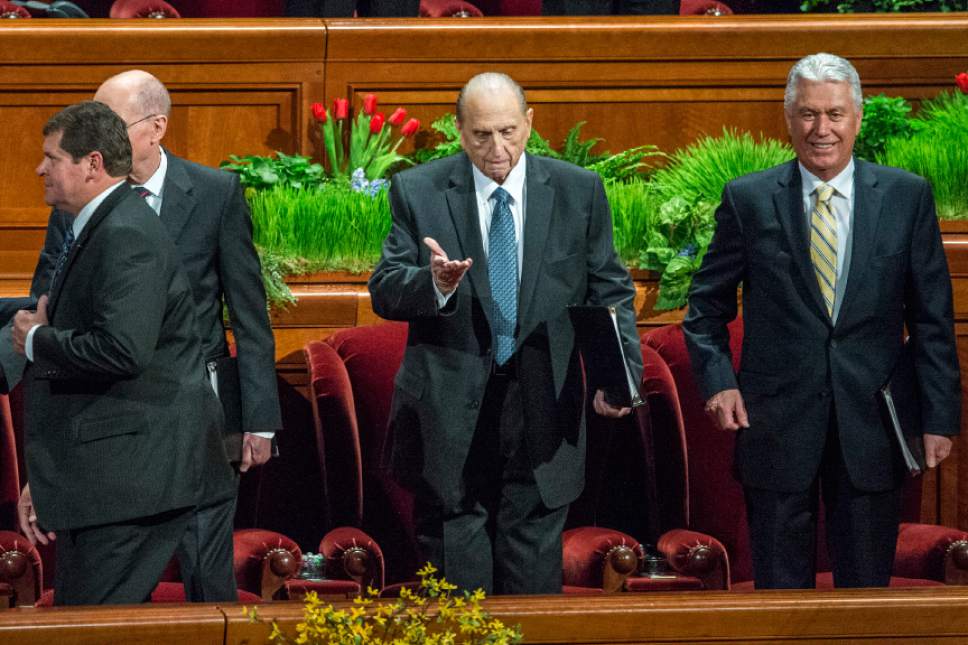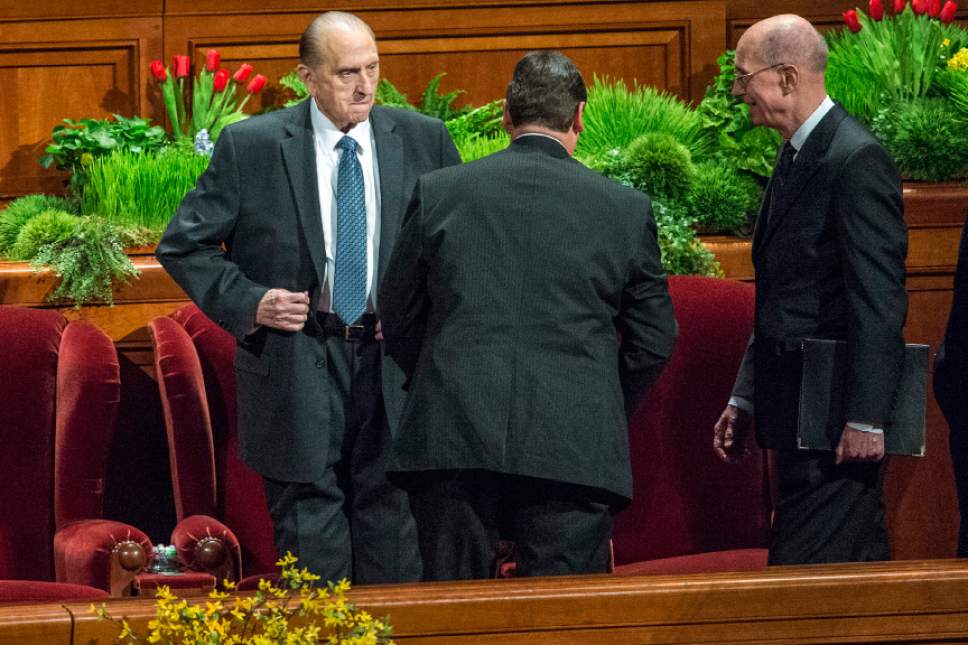This is an archived article that was published on sltrib.com in 2015, and information in the article may be outdated. It is provided only for personal research purposes and may not be reprinted.
Speaker after Mormon speaker warned Saturday about the need to defend "traditional families" — a legally married mother and father, who rear their children together — and about the dangers of "counterfeit and alternative lifestyles."
"Strong traditional families are not only the basic units of a stable society, a stable economy and a stable culture of values," LDS apostle L. Tom Perry said in the morning session of the faith's 185th Annual General Conference, "but ... they are also the basic units of eternity, and of the kingdom and government of God."
Perry, who at age 92 is the oldest Mormon apostle, lamented the media's glorification of "immorality and amorality," suggesting that it makes it harder to keep marriages and families intact.
"Despite what much of media and entertainment outlets may suggest, however, and despite the very real decline in the marriage and family orientation of some," he said, "the solid majority of mankind still believes that marriage should be between one man and one woman."
The drumbeat for "traditional families" comes in the wake of the increasing legalization of same-sex marriage — in Utah, most U.S. states and many other nations.
LDS Church President Thomas S. Monson, who is 87, skipped his customary welcoming remarks Saturday morning as part of an effort to limit his public addresses this weekend.
Monson was present and presided at all three Saturday sessions, occasionally waving to onlookers and friends in the audience before and after the meetings.
"President Monson has chosen to reduce the number of talks he will deliver this conference," church spokesman Dale Jones said in a news release. "Over the years various formats have been used in General Conference programs."
Instead, President Dieter F. Uchtdorf, Monson's second counselor, greeted the 20,000 Mormons assembled in the Conference Center in downtown Salt Lake City and millions more listening and watching across the globe.
This spring's General Conference officially started last Saturday with the General Women's meeting, which for the first time was designated the first session of the twice-yearly gatherings.
Perry began his address by describing the LDS Church's involvement with last fall's Colloquium on Marriage and Family, which Pope Francis convened at the Vatican and included representatives from 14 faiths.
"It was remarkable for me to see how marriage and family-centered priorities cut across and superseded any political, economic or religious differences," Perry said. "When it comes to love of spouse and hopes, worries and dreams for children, we are all the same."
But Mormons alone have "an eternal perspective" on marriage, Perry said. "We take the commitment and the sanctity of marriage to a greater level because of our belief and understanding that families go back to before this Earth was, and that they can go forward into eternity."
The Church of Jesus Christ of Latter-day Saints hopes to be "a leader and a participant in worldwide movements" to strengthen marriage and families, he said. " ... We want our voice to be heard against all of the counterfeit and alternative lifestyles that try to replace the family organization that God himself established."
Other conference speakers also zeroed in on marriage and family.
"The end of all activity in the church is to see that a man and a woman with their children are happy at home and sealed together for time and for all eternity," said Boyd K. Packer, the 90-year-old president of the Quorum of Twelve Apostles and next in line for the Mormon presidency.
"The desire to mate in humankind is constant and very strong. Our happiness in mortal life, our joy and exaltation, are dependent upon how we respond to these persistent, compelling physical desires," said Packer, who spoke from his seat — as has been his routine in recent years — with some difficulty. " ... Pure love presupposes that only after a pledge of eternal fidelity, a legal and a lawful ceremony, and ideally after the sealing ordinance in the temple, are those procreative powers released in God's eye for the full expression of love. It is to be shared only and solely with that one who is your companion forever."
Packer also praised Donna Smith Packer, his wife of nearly 70 years, and spoke fondly of mature marriages that have stood the test of decades.
"If you suppose that the full-blown rapture of young romantic love is the sum of the possibilities which spring from the fountains of life, you have not yet lived to see the devotion and the comfort of longtime married love," he said. "Married couples are tried by temptation, misunderstandings, financial problems, by family crises, by illness, and all the while love grows stronger. Mature love has a bliss not even imagined by newlyweds."
Linda K. Burton, general president of the Relief Society, the church's global organization for adult Mormon women, spoke about men and "their God-given roles ... including righteously presiding and providing for and protecting their families."
Burton said she was "painfully aware that the topics of fatherhood, motherhood and marriage can be troubling for many."
Some Latter-day Saints "feel that their homes will never reach what they perceive to be the ideal. Many are hurting because of neglect, abuse, addictions and incorrect traditions and culture," Burton said. "I do not condone the actions of men or women who have willfully or even ignorantly caused pain, anguish and despair in their homes."
She focused instead on Mormonism's ideals for men, which she said can be tough in today's society.
"It must be difficult, at best, for covenant men to live in a world that not only demeans their divine roles and responsibilities but also sends false messages about what it means to be a 'real man,' " Burton said. "One false message is 'it's all about me.' On the other end of the scale is the degrading and mocking message that husbands and fathers are no longer needed."
The relationship between husbands and wives, she added, is mutually beneficial, not competitive.
"As covenant-keeping women and men, we need to lift each other and help each other become the people the Lord would have us be," Burton said. "And we need to work together to lift the rising generation and help them reach their divine potential as heirs of eternal life."
During the "sustaining vote" of top Mormon leaders in the afternoon session — when Latter-day Saints typically silently raise their right hands to show support for LDS authorities — several "opposed" voices rang out amid the Conference Center throngs.
Each time the contrary voices were heard, Uchtdorf, who was reading the lists of leaders, replied: "The vote has been noted." He suggested that those who cast opposing votes consult with their local LDS leaders.
After that business was conducted, the sermons continued — with family issues again leading the way.
"A family built on the marriage of a man and woman supplies the best setting for God's plan to thrive — the setting for the birth of children who come in purity and innocence from God, and the environment for the learning and preparation they will need for a successful mortal life and eternal life in the world to come," apostle D. Todd Christofferson said. "A critical mass of families built on such marriages is vital for societies to survive and flourish. That is why communities and nations generally have encouraged and protected marriage and the family as privileged institutions. It has never been just about the love and happiness of adults."
Every person "carries the divine image," the apostle said, "but it is in the matrimonial union of male and female as one that we attain perhaps the most complete meaning of our having been made in the image of God — male and female."
And that standard will not change, Christofferson said, and no one "can alter this divine order of matrimony."
Husbands and wives "are equal partners," apostle Quentin L. Cook said. "They have different, but complementary responsibilities."
The wife "may bear children which blesses the entire family The husband may receive the priesthood which blesses the entire family," Cook said. "But in family council, wives and husbands, as equal partners, make the most important decisions. They decide how the children will be taught and disciplined; how money will be spent; where they will live; and many other family decisions. These are made jointly after seeking guidance from the Lord. The goal is an eternal family."
Cook mentioned the value of Mormon wards, or congregations, which generally are determined geographically.
"We don't divide by class or rank. We rejoice in the fact that all races and cultures are mixed together in a righteous congregation," he said. "Our ward family is important to our progress, happiness and personal effort to be more Christ-like."
Cook lauded those wards set up for certain languages, such as Spanish-speaking congregations.
"It is important for members to understand the gospel in the language of their heart," said, "so they can pray and act in accordance with gospel principles."
The apostle dismissed the claim that "more members are leaving the church today, and that there is more doubt and unbelief than in the past."
That is "simply not true," Cook said. The LDS Church "has never been stronger."
He stated that the "number of members removing their names from the records of the church has always been very small and is significantly less in recent years than in the past." At the same time, he said, "the increase in demonstrably measurable areas, such as endowed members with a current temple recommend, adult full-tithe payers, and those serving missions, has been dramatic."
Other speakers talked about Jesus Christ's atoning power, repentance, humility and the joy of living the Christian gospel.
Wilford W. Andersen of the Second Quorum of Seventy compared the Mormon faith to learning to dance.
"Sometimes in our homes, we successfully teach the dance steps, but are not as successful in helping our family members to hear the music," Andersen said. "We learn the dance steps with our minds, but we hear the music with our hearts."
The steps "are the things we do," he said. "The music of the gospel is the joyful spiritual feeling that comes from the Holy Ghost. It brings a change of heart and is the source of all righteous desires. The dance steps require discipline, but the joy of the dance will only be experienced when we come to hear the music."
Teaching children to "dance" cannot be done with "unkindness or pride or envy," he said. "If we lose that delicate influence in our lives, the rich harmonies of the gospel can quickly become dissonant and can ultimately be silenced."
Dale G. Renlund of the First Quorum of the Seventy quoted the late South African leader Nelson Mandela as saying, "a saint is a sinner who keeps on trying."
That should "reassure and encourage members of the church," Renlund said. "Although we are referred to as 'Latter-day Saints,' we sometimes flinch at this reference. The term 'saints' is commonly used to designate those who have achieved an elevated state of holiness or even perfection. And we know perfectly well that we are not perfect."
But Mormon theology does teach that believers may be "perfected by repeatedly and iteratively 'relying wholly upon' the doctrine of Christ: exercising faith in him, repenting, partaking of the sacrament to renew the covenants and blessings of baptism, and receiving the Holy Ghost as a constant companion to a greater degree."
As members do so, he said, "we become more like Christ and are able to endure to the end."
God cares "a lot more about who we are, and who we are becoming," Renlund said, "than about who we once were."
He wants believers, the Seventy said, to "keep on trying."
Twitter: @religiongal —
Mormonism by the numbers
Members • 15,372,337
Converts (in 2014) • 296,803
Full-time missionaries • 85,147
Church-service missionaries • 30,404
Wards and branches • 29,621
Stakes • 3,114
Missions • 406
Operating temples • 144
Source: Statistical report from LDS First Presidency as of Dec. 31, 2014


